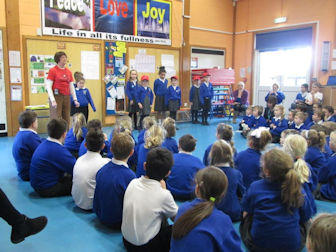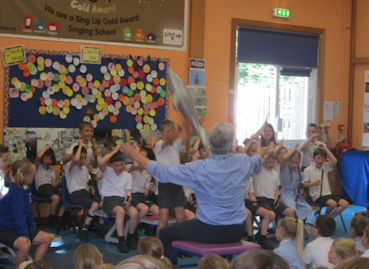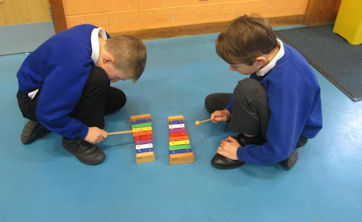Music
Intent
Music is an important part of the curriculum at Stratford-sub-Castle Primary School. We aim for all children to develop the self-confidence, skills, knowledge and understanding which lead to a lifelong love of music whilst also providing a secure foundation that enables them to take music further should they wish to.
We want to encourage a love of music through:
- developing an awareness of the techniques and skills involved in singing and playing
- developing an understanding of how music is composed
- developing their cultural capital to include different genres and styles of music over time and from around the world
- developing their self-confidence in performing both in groups and as individuals
- developing the ability to listen with concentration and respond to a wide variety of music
- developing their awareness of the part music plays in team-work
- encouraging the children to realise that everyone can be a musician

Implementation


Music is taught both as a discrete subject and across the curriculum. Areas of learning such as times tables in maths, vocabulary in languages, response through art and writing and movement in dance can all incorporate different elements of music.
Making music in school, in church and with other schools in our cluster (in Salisbury Cathedral and the City Hall, for example) gives the children an opportunity to develop their singing and playing skills and to gain an understanding of how ensembles work.
Our children learn the techniques involved in singing and playing (percussion and recorders) and learn that warming-up is as important in music as in PE. They sing a wide range of songs in a number of languages and from different times and cultures.
Children develop their understanding of rhythm and pitch, dynamics, duration, timbre and texture and and acquire the technical vocabulary for these elements. They learn how music is structured which helps them to compose and perform their own music, firstly as a class and then in small groups and as individuals. As their confidence builds, they enjoy performing in end-of-year shows, nativities and services in church. They listen and respond to music from different eras and cultures and are introduced to opera and ballet as different ways to tell stories with music.
We follow the Model Music Curriculum and use Sing Up to support this in our delivery of the National Curriculum. Units of work are planned with the wider curriculum in mind as part of a two year rolling programme. Lessons are accessible to all and activities are differentiated where necessary to meet the range of abilities and needs in each class.
In EYFS and KS1, we introduce music through games and movement and encourage children to think about the pieces they listen to in terms of how it makes them feel, the different instruments they can hear and whether they like it or not. Some of the songs we sing in EYFS will already be familiar to the children, eg: nursery rhymes, and we build on these as the children progress through the school. Percussion instruments are used independently and to accompany songs and children are shown how to create their own musical patterns to fit the style of the songs.
In KS2 we build on the skills developed earlier in the school to introduce them to a wider range of music, sung, played and listened to so they become familiar with a variety of vocal and instrumental styles. They begin to learn to read and write music using their own and standard notations. The children learn to appreciate than the teamwork, listening and cooperation involved in making music are all useful across the curriculum. Children at this key stage have the opportunity to join the School Choir which offers more opportunity to extend their skills and ability to perform.
Regular involvement in meetings and CPD with our cluster schools ensures that we keep up-to-date with current thinking in music education.
Impact
The impact of learning music can be seen across the school. Children can be heard singing spontaneously out-of-doors and in classrooms. Our children realise that everyone can be a music-maker and that they can all make progress. Performances are well received by their peers and by adults in school and in the wider community. Children feel free to offer their opinions about the styles of music they particularly enjoy and are able to discuss their choices uses appropriate vocabulary. Participation in music-making develops well-being, promotes listening skills and develops concentration. We are confident that our children leave Stratford-sub-Castle with a love of music and a desire to build on this in the future.
- Music



